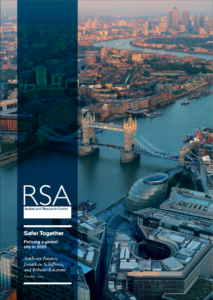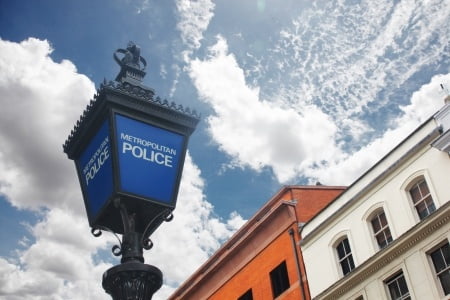Policing a global city in 2020
A major new report on the future policing of London was published earlier this month (15 October 2015): Safer Together: Policing a global city in 2020.
The RSA was commissioned by the Metropolitan Police to look at how the service could adapt to the many changes and challenges it will face over the next five years and more. The report is based on a large scale consultation exercise with 500 of the most senior Met officers and others throughout the service and a consultation involving more than seventy external organisations.
to the many changes and challenges it will face over the next five years and more. The report is based on a large scale consultation exercise with 500 of the most senior Met officers and others throughout the service and a consultation involving more than seventy external organisations.
Safer Together presents an ambitious set of proposals with the intention of generating a public conversation about the future of London’s safety.
The report is of such scale and significance that I am covering it into two posts. Yesterday’s post set out the report’s views of the challenges facing London and the Met, today’s looks at the proposed solutions.
[divider]
A shared mission
The report concludes that in the context of changes in London and changes in criminality, successfully minimising risk and harm will require the Met and its partners to share accountability much more fundamentally.
The RSA argues that the Met must foster trust among partners and legitimacy in the eyes of the public through a step change in transparency, allowing for a shared understanding of demands and decision-making regarding prioritisation of resources.
To effectively deploy shrinking resources, the Met and its partners must engage in new collaborative initiatives. This in turn requires additional devolved powers so that London can govern its own systems for justice, probation and prisons.
Without public agencies, local authorities and London’s communities sharing the burden through deep collaboration, the RSA says that there is a real risk that London’s safety and security will be undermined. The report argues that the worst (but easily foreseeable) outcome is that public services dump cost and responsibility on one another in response to resource constraints.
This will create unnecessary cost, duplication, gaps and overall reduce the effectiveness of the range of agencies, as well as the public itself, in keeping London and Londoners safe.
The RSA advocates that the changes it recommends should be embodied in a shared, albeit informal, mission, in the form of public, private, and voluntary sectors working closely with London’s communities. The report envisages that this shared mission, which needs to be based on trust generated through common causes, defines the purpose of the police, supports civil liberties, defines community responsibilities and that of other organisations and agencies. It commits partners to achieving the collective impact of ensuring the safety of Londoners.
[divider]
Four key proposals
The RSA makes four specific proposals to take policing in London forward:
- A Community Safety Index for London that will combine objective measures of crime and incidence of risk and harm with subjective measures such as feelings of safety, absence of anti-social behaviour and neighbourhood quality.
- A London Policing Impact Unit that would combine operational, academic, and strategic knowledge. The Impact Unit would analyse data and learn from on-the-ground experience of ‘what works’. These lessons would then be applied in the Met. A representative Citizens’ Panel would inform its work.
- New forms of collective impact to focus on particular challenges should be extended. These will broaden and widen the Multi-Agency Safeguarding Hub approach where agencies work in close cooperation. This means a permanent engagement on shared issues of concern such as domestic violence, mental health, or anti-social behaviour.
- A deepening of the Met’s engagement with victims and witnesses, for example through greater deployment of restorative justice and greater analysis of victim needs and more continuous communication with them. Only through devolution of more powers over the criminal justice system to London can this take place convincingly. And there is a need for deeper community engagement – especially through the Safer Neighbourhood Boards and through the smart use of social media.
If the policing of London is important to you, I strongly recommend reading the report in full, the RSA has also made available an overview of the evidence they collated to underpin the report.


